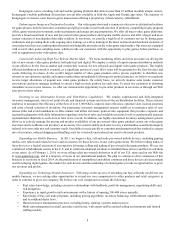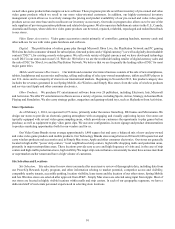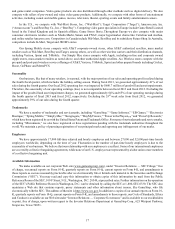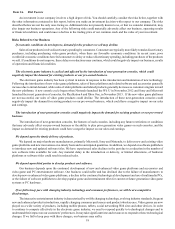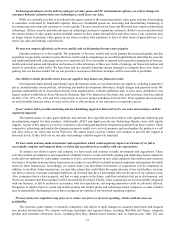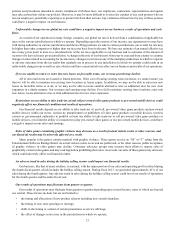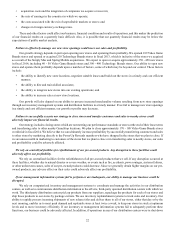GameStop 2013 Annual Report Download - page 35
Download and view the complete annual report
Please find page 35 of the 2013 GameStop annual report below. You can navigate through the pages in the report by either clicking on the pages listed below, or by using the keyword search tool below to find specific information within the annual report.18
Item 1A. Risk Factors
An investment in our company involves a high degree of risk. You should carefully consider the risks below, together with
the other information contained in this report, before you make an investment decision with respect to our company. The risks
described below are not the only ones facing us. Additional risks not presently known to us, or that we consider immaterial, may
also impair our business operations. Any of the following risks could materially adversely affect our business, operating results
or financial condition, and could cause a decline in the trading price of our common stock and the value of your investment.
Risks Related to Our Business
If economic conditions do not improve, demand for the products we sell may decline.
Sales of our products involve discretionary spending by consumers. Consumers are typically more likely to make discretionary
purchases, including purchasing video game products, when there are favorable economic conditions. In recent years, poor
worldwide economic conditions have led consumers to delay or reduce discretionary spending, including purchases of the products
we sell. If conditions do not improve, these delays or reductions may continue, which could negatively impact our business, results
of operations and financial condition.
The electronic game industry is cyclical and affected by the introduction of next-generation consoles, which could
negatively impact the demand for existing products or our pre-owned business.
The electronic game industry has been cyclical in nature in response to the introduction and maturation of new technology.
Following the introduction of new video game platforms, sales of these platforms and related software and accessories generally
increase due to initial demand, while sales of older platforms and related products generally decrease as customers migrate toward
the new platforms. A new console cycle began when Nintendo launched the Wii U in November 2012 and Sony and Microsoft
launched their next generation of consoles, the PlayStation 4 and Xbox One, in November 2013. If the new video game platforms
are not successful, our sales of video game products could decline. The introduction of these next-generation consoles could
negatively impact the demand for existing products or our pre-owned business, which could have a negative impact on our sales
and earnings.
The introduction of next-generation consoles could negatively impact the demand for existing products or our pre-owned
business.
The introduction of next-generation consoles, the features of such consoles, including any future restrictions or conditions
that may adversely affect our pre-owned business or the ability to play prior generation video games on such consoles, and the
impact on demand for existing products could have a negative impact on our sales and earnings.
We depend upon the timely delivery of products.
We depend on major hardware manufacturers, primarily Microsoft, Sony and Nintendo, to deliver new and existing video
game platforms and new innovations on a timely basis and in anticipated quantities. In addition, we depend on software publishers
to introduce new and updated software titles. We have experienced sales declines in the past due to a reduction in the number of
new software titles available for sale. Any material delay in the introduction or delivery, or limited allocations, of hardware
platforms or software titles could result in reduced sales.
We depend upon third parties to develop products and software.
Our business depends upon the continued development of new and enhanced video game platforms and accessories and
video game and PC entertainment software. Our business could suffer and has declined due to the failure of manufacturers to
develop new or enhanced video game platforms, a decline in the continued technological development and use of multimedia PCs,
or the failure of software publishers to develop popular game and entertainment titles for current or future generation video game
systems or PC hardware.
If we fail to keep pace with changing industry technology and consumer preferences, we will be at a competitive
disadvantage.
The interactive entertainment industry is characterized by swiftly changing technology, evolving industry standards, frequent
new and enhanced product introductions, rapidly changing consumer preferences and product obsolescence. Video games are now
played on a wide variety of products, including mobile phones, tablets, social networking Web sites and other devices. In order
to continue to compete effectively in the electronic game industry, we need to respond quickly to technological changes and to
understand their impact on our customers’ preferences. It may take significant time and resources to respond to these technological
changes. If we fail to keep pace with these changes, our business may suffer.


